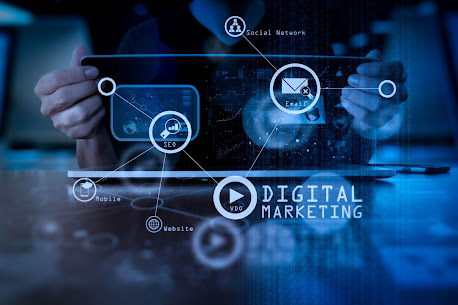Introduction to Digital Marketing:
Digital marketing refers to the use of various online platforms, channels, and technologies to promote products, services, or brands to a targeted audience. In today's digital age, businesses and marketers leverage the power of the internet and digital devices to reach potential customers, build brand awareness, drive website traffic, and generate leads or sales.
The primary objective of digital marketing is to connect with consumers where they spend a significant amount of their time: online. This form of marketing allows businesses to engage with their target audience in a more personalized and interactive manner compared to traditional marketing methods.
Key Components of Digital Marketing:
1. Search Engine Optimization (SEO): SEO involves optimizing a website's content, structure, and design to improve its visibility on search engine results pages. The goal is to increase organic (non-paid) traffic from search engines.
2. Content Marketing: This strategy focuses on creating and distributing valuable, relevant, and consistent content to attract and retain a clearly defined audience. Content can be in the form of blog posts, articles, videos, infographics, podcasts, and more.
3. Social Media Marketing: Social media platforms provide an avenue for businesses to interact with their audience, share content, and run targeted advertising campaigns. Popular social media platforms include Facebook, Instagram, Twitter, LinkedIn, and YouTube.
4. Email Marketing: Email remains a powerful tool for direct communication with customers. Businesses use email marketing to send promotional content, updates, newsletters, and special offers to their subscribers.
5. Pay-Per-Click (PPC) Advertising: PPC advertising allows businesses to display their ads on search engines and other websites, paying only when a user clicks on their ad. This model offers a way to reach a targeted audience and drive traffic quickly.
6. Affiliate Marketing: In this model, businesses partner with affiliates who promote their products or services in exchange for a commission on each sale generated through their efforts.
7. Influencer Marketing: Brands collaborate with influential individuals on social media or other online platforms to promote their products or services to their followers.
Benefits of Digital Marketing:
1. Global Reach: Digital marketing enables businesses to reach a global audience, breaking down geographical barriers.
2. Targeted Advertising: Precise targeting options allow marketers to reach specific demographics, interests, and behaviors, ensuring ads are shown to the right audience.
3. Cost-Effectiveness: Digital marketing can be more cost-effective compared to traditional marketing methods, especially for small businesses and startups.
4. Measurable Results: Marketers can track and analyze the performance of their campaigns in real-time, allowing for data-driven decision-making and optimization.
5. Personalization: Digital marketing facilitates personalized communication, fostering stronger connections with customers.
As technology continues to evolve, digital marketing will remain a critical aspect of modern business strategies, helping companies thrive in an increasingly digital world.
By Dr. P. Devapattabiraman


Comments
Post a Comment